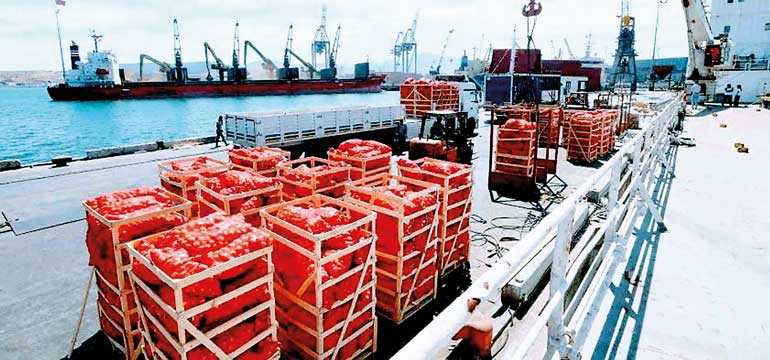Monday Feb 23, 2026
Monday Feb 23, 2026
Monday, 1 April 2019 00:00 - - {{hitsCtrl.values.hits}}

By Thisuri Wanniarachchi
Strengthening the agricultural sector has been a key element in the national development strategy of almost every government that has come to power since independence. While prioritising the needs of the agricultural sector has always been a prevalent rhetorical theme in our national political discourse, it’s hard to deny that Sri Lanka has a tragic track record when it comes to dealing with issues in this sector.
One such major issue that has gone unaddressed for a long time is that of perishables going to waste in mass scale. Everyday many metric tons of perishables end up in waste dumps or as elephant feed. The financial cost of wastage aside, this phenomenon has a serious negative impact on the confidence of the farming community and the sustainability of our agriculture sector; constant price fluctuations make it extremely difficult for the farmers to sustain their livelihoods.
We have watched this happen for many decades, but not much has been done to bring a sustainable solution to resolve this crisis. It isn’t that complicated; the main issue here is that post-harvesting inadequacies lead to the farmers failing to fetch a reasonable price for their produce which in turn leads to extreme levels of post-harvest loss.
This can be fixed. Post-harvesting inadequacies can be addressed if the Government works with the farmer, the trader and the consumer in creating a system that makes the full use of available technology and the markets of the world. ‘Prabhashwara’, a new initiative by the Government which will be launched today in Dambulla aims to do just that.
The 2019 Budget proposed Rs. 400 million to establish effective storage and warehousing facilities to minimise post-harvest losses. On Saturday, the foundation stone was laid to initiate the construction of Sri Lanka’s first Temperature and Humidity-Controlled Warehouse Complex for Perishables in Dambulla with a capacity of 5000 metric tons, capable of storing the excess harvest of vegetables and fruits. Following the completion of construction of the Dambulla warehouse complex, the Government will invest in similar facilities in Katunayake, Embilipitiya, Jaffna and Keppetipola.
The warehouse facilities can help stabilise prices and elevate the quality of the produce. It encourages the production of high quality produce that can be stored for longer periods of time under storage mechanisms sensitive to each product. It also guarantees the supply of seasonal products to the market, helping to stabilise the supply. These massive facilities will be eco-systems of their own, creating new jobs within the warehouse complexes as well as the transportation networks that connect to it.
This project is implemented by the Ministry of Economic Reforms and Public Distribution with the support of the Food Commissioner’s Department. A group of committed public servants, private sector professionals, and a team of young analysts with a shared vision have been working for several months with the farming community in Dambulla to understand the needs of the farmer and the trader, and get this project off the ground.
It’s the brain child of Minister Harsha de Silva who has been trying to solve this issue for nearly 17 years, working with the farming community of Dambulla since 2002 to streamline production. He believes that this initiative could kick start a paradigm shift in the Sri Lankan agriculture sector, revolutionising it to an almost unrecognisable degree.
He says, quite confidently, that this could lead us to a day when “the produce harvested by a farmer in Dambulla could be sold in a market in Paris on the very same day”. Any Sri Lankan political communications strategist would advise him against saying that line.
It reminds me of the time in the early 2000s when Prime Minister Ranil Wickremesinghe talked about a day when a farmer would wear modern clothes and use a mobile phone, and a vast majority of Sri Lankans found it to be so farfetched and hilarious. Comedians and cartoonists famously joked about a ‘mod-goviya’ who would use a mobile phone and wear pants instead of an amude.
Back then, anyone would have called his statement a communications disaster. Looking back, however, you can’t help but think how right he was. Our society has caught up with the modernisation that the Prime Minister was talking about then, and it doesn’t seem so farfetched today.
What he was talking about then was an inevitable paradigm shift in the agriculture industry that will happen with globalisation induced modernisation. The fact that we found it unbelievable back then also brings out a serious impediment in us Sri Lankans: our inability to believe in ourselves. We limit ourselves to the narrow horizons we inherited from our past and we ridicule big ideas of people who dare to dream.
Today, Dr. de Silva stands on a bare land in Dambulla that would turn into a massive state-of-the-art perishables warehouse complex in five months and envisions a day when such warehouses have multiplied across the island, stabilising the local market, opening ourselves up to markets around the world.
He’s confident that winds of change are coming and this seemingly small step for Dambulla maybe a big stride in achieving the long-awaited paradigm shift we all want to see in Sri Lankan agriculture. Maybe he’s too ambitious or maybe this is exactly the kind of daring attitude we need to have if we are to achieve the modernised agriculture sector we want to see. Winds of change are coming, and it’s time we start believing in it. The mod-goviya is already here, and soon he may be selling to Paris.
(The writer is an award-winning novelist, a PhD Candidate in Public Policy at the University of Colombo and the Lead Analyst of the Ministry of Economic Reforms and Public Distribution.)